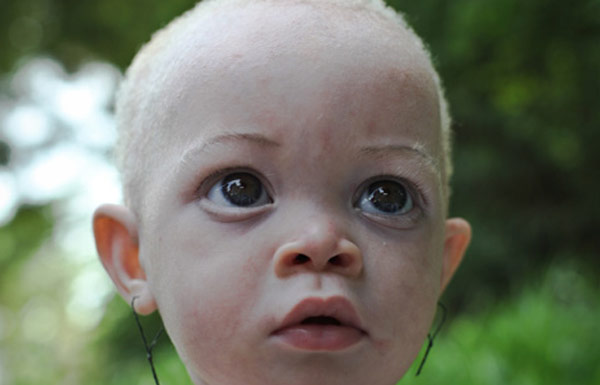
A consortium of human rights organizations have expressed dismay with the silence from the authorities in light of increasing cases of physical attacks, killings, abductions, mutilations and infanticide of persons with albinism (PWAs) in Malawi.
The organizations, which included the Association for Persons with Albinism in Malawi (APAM), the Catholic Commission for Justice and Peace of the Episcopal Conference of Malawi (CCJP), the Centre for Human Rights and Rehabilitation (CHRR) and Malawi Human Rights Resource Centre (MHRRC), lament that persons with albinism continue to hunted like animals and do not have peace.
Leaders of the concerned human rights watchdogs addressed journalists in Lilongwe on Friday where they strongly condemned and rebuked the spate of attacks on PWAs.
Reading a joint statement, APAM president Young Muhamba observed that the situation is thriving unabated in the context of poor and weak community protection systems is even more worrisome and a huge threat to the right to security, and ultimately the right to life and other fundamental entitlements, for persons with albinism in the country.
Muhamba disclosed that Malawi is the worst case on the whole African continent as far as the attacks, abductions and killings of PWAs are concerned.
“In fact, Under the Same Sun report of 2017, 30 per cent of the cases of crimes against PWAs from 28 African countries were from Malawi. This is disheartening and needs to be condemned in the strongest terms possible,” he said.
Muhamba challenged the Malawi Police Service to assure PWAs of their security in 2022, stressing that the PWA community would not want to experience another attack next year and beyond.
“Any kind of attack brings fear to us and we have a feeling that certain quarters within the Malawi society would like to wipe out the population of persons with albinism. Why should persons with albinism be hunted like animals? We are dismayed with the Malawi Government’s laissez-faire attitude in addressing these human rights concerns, challenges and outstanding problems encountered by persons with albinism under the context of these attacks,” he said.
On the other hand, the CCJP National Coordinator Boniface Chibwana said they are worried that the country’s health system continues ignoring the needs of the PWA community by not making available and accessible quality health services.
Chibwana lamented that there are no medications such as sunscreen lotion in almost all the public health facilities to protect the PWAs from cancer attacks.
“Since 2020, more than 25 innocent souls of PWAs have been lost to skin cancer while more than 50 PWAs are currently battling with skin cancer in their respective homes. It should be clearly stated that about 99 per cent of deaths of persons with albinism in Malawi are due to skin cancer. The government of Malawi has provided only limited support for the medical needs of PWAs. Sunscreen lotion is not available and accessible in many government health facilities such as health centres and health posts in much of the country’s rural areas where 87 per cent of persons with albinism live. Eye treatment is also neglected as mobile clinics for eyesight assessment and actual treatment are not available to most rural, remote and hard-to-reach areas. Sunscreen lotion and dermatological services are also centralised making it difficult for rural PWAs to access them due to their stricken poverty level,” he said.
On defective and delayed justice and increasing impunity, CHRR Executive Director Michael Kaiyatsa said it is bewildering to see that Malawi still cries out against the delays in justice delivery over the cases of crimes against persons with albinism.
Kaiyatsa said while they appreciate the Judiciary for the completion of some cases, they are, however, concerned that the cases are too slow to be completed.
“It is puzzling that there are some cases that are still pending judgement or are still at the hearing stage in the courts since 2018. Actually, less than 40 per cent of the officially recorded 197 cases have been concluded by the justice system to ensure the effective dispensation of justice as a foundational and fundamental right. This does not inspire persons with albinism who are incessantly crying out for justice that is really just, fair and widely acceptable,” he narrated.
He added, “One wonders why it is taking so long to conclude these cases. It is clear that these delays have caused impunity in the handling of the cases; further, this has compelled persons with albinism in Malawi to be hopeless and lose trust in the country’s criminal justice system. There are many cases whose investigations are yet to be completed. We also wonder why cases dating back to 2016 are still under investigation.
“How competent are the investigators? How complicated are the cases? Missing of files at some justice institutions like police formations is indicative of a defective and deficient justice system that is also suspicious as far as the delivery of justice is concerned. Such suspicions and fears grow even stronger when the country experiences suspicious deaths in police or prison custody of people connected to the crimes against persons with albinism. The Buleya Lule case, which many of you working in the media are well aware of, is a classic and illustrative one. We demand effective investigation and thorough consideration of these suspicious deaths.”
Commenting on claims political activist Bon Kalindo has been making that he has evidence on the people behind the heinous crimes against PWAs, MHRRC Executive Director, Emma Kaliya, said they are looking forward to seeing police, judiciary and the prosecution to seize the opportunity to uncover the market for the body tissues for persons with albinism.
Kaliya wondered why he had been keeping “such important information to himself when our brothers and sisters with albinism are being killed like animals.”
“We are keeping our eyes open on the matter. We are not sleeping to ensure that justice is done,” she said.

